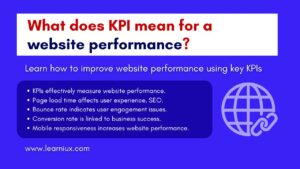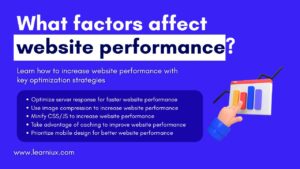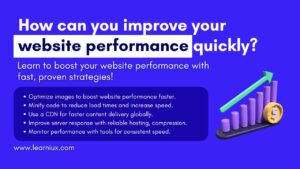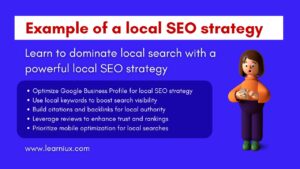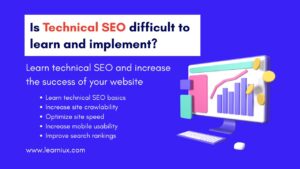Off-page SEO is a pillar of digital marketing that focuses on increasing a website’s visibility, authority, and relevance through activities outside of the website. Unlike on-page SEO, which is concerned with optimizing elements such as website content, meta tags, and site structure, off-page SEO involves external strategies that signal credibility and trustworthiness to search engines like Google. These external signals help search engines determine how valuable and authoritative a website is, which directly impacts its ranking on search results pages. For businesses and individuals looking to strengthen their online presence, understanding and implementing effective off-page SEO strategies is essential. This article explores practical examples of off-page SEO, providing insight into how these techniques can be used to achieve measurable results in today’s competitive digital landscape.
One of the most effective off-page SEO strategies is building high-quality backlinks. Backlinks are links from other websites that point to your site, acting as an endorsement or vote of confidence in the eyes of search engines. When reputable websites link to your content, it signals to search engines that your site is trustworthy and relevant, which can significantly boost your rankings. However, not all backlinks are created equal. The quality of the linking site matters more than the quantity. For example, a single backlink from a highly authoritative website, such as a major news outlet or industry-leading blog, carries more weight than dozens of links from low-quality or spammy sites. One effective approach to building high-quality backlinks is guest blogging. This involves writing valuable and informative content for a reputable website in your niche. For example, a digital marketing agency might provide a detailed article on content marketing strategies on a well-known marketing blog, including a link back to their website. This not only increases referral traffic but also strengthens off-page SEO by associating the brand with a trusted source. To make guest blogging effective, the content should be tailored to the host site’s audience, providing actionable insights or unique perspectives that encourage engagement and sharing.
Another way to secure high-quality backlinks is to collaborate with influencers or thought leaders in your industry. Influencers often have their own blogs, websites, or social media platforms where they can mention your brand or link to your content. For example, a fitness brand can get a backlink from the influencer’s blog or website if they partner with a popular fitness influencer for a product review. This not only boosts off-page SEO, but it also exposes the brand to the influencer’s audience, which is likely to drive more traffic and engagement. When collaborating with influencers, it’s important to choose partners whose audiences align with your target market. Authenticity is key, as both search engines and users value genuine recommendations over forced or overly promotional content.
Beyond backlinks, social media engagement plays a crucial role in off-page SEO. Social signals like likes, shares, and comments may not directly impact search engine rankings, but they do increase a website’s reach and visibility. The more your content is shared on platforms like X, LinkedIn, or Instagram, the more likely it is to attract the attention of other websites, which in turn increases the likelihood of backlinks or brand mentions. Creating shareable content is a powerful off-page SEO tactic. For example, an infographic that breaks down a complex industry trend in a visually appealing format can go viral on social media, driving traffic to your website, and increasing brand awareness. Videos, interactive quizzes, or thought-provoking blog posts also work well on social platforms. The key is to create content that your audience will love, addressing their pain points or interests in a way that encourages sharing. For example, a travel company could create a video showcasing hidden gems in a popular destination, prompting users to share it with their followers, thereby increasing visibility and boosting off-page SEO.
Interacting with online communities is another effective off-page SEO strategy. Platforms like Reddit, Quora, or specific niche forums provide opportunities to showcase expertise and build brand authority. By answering questions, participating in discussions, or sharing valuable insights, you can establish yourself as a knowledgeable resource in your field. For example, a software company might join a Reddit thread about coding challenges and provide detailed solutions by subtly linking to relevant blog posts on their website. This not only increases traffic, but it also increases the likelihood that other users will reference or link to your content, further boosting off-page SEO. However, it’s important to approach community engagement in an honest way. Overtly promotional tactics can backfire, as online communities value genuine contributions over self-serving plugs. By consistently providing value, you can build trust and encourage organic mentions of your brand.
Brand mentions, even without direct links, are another important aspect of off-page SEO. Search engines like Google use advanced algorithms to identify when a brand is mentioned on the web, whether in articles, reviews, or social media posts. These unlinked mentions contribute to a website’s authority by showing its relevance and importance in a given industry. One way to build brand mentions is to encourage customer reviews and testimonials. For example, a local business like a restaurant or retail store can ask satisfied customers to leave reviews on platforms like Google My Business, Yelp, or industry-specific directories. Positive reviews not only build trust with potential customers, but also serve as a strong off-page SEO signal. Responding to both positive and negative reviews, both positive and negative, shows professionalism and engagement, further strengthening your brand’s reputation. For example, a restaurant that proactively responds to Google reviews by acknowledging or thoughtfully resolving complaints can boost its off-page SEO by demonstrating a commitment to customer satisfaction.
Media coverage and press releases are also powerful off-page SEO tools. When a reputable news outlet, magazine, or blog features your brand, it shows authority to search engines. For example, a tech startup launching a new product might distribute a press release to online publications, resulting in articles or mentions highlighting their innovation. While these mentions may not include direct links, they contribute to off-page SEO by connecting the brand to credible sources. To maximize results, businesses can provide journalists with unique stories or perspectives, such as case studies about how their product solved a specific problem. Building relationships with media outlets and bloggers in your industry can provide consistent coverage over time, which can further boost off-page SEO.
Another overlooked off-page SEO strategy is participating in industry events, webinars, or podcasts. Speaking at a conference or being a guest on a popular podcast can lead to mentions or backlinks from event websites, podcast pages, or related blogs. For example, a cybersecurity expert invited to speak at a tech conference could be featured on the event website with a link to their company blog. These opportunities not only boost off-page SEO but also position the brand as a thought leader, capturing the attention of both users and search engines. To make the most of such opportunities, it is important to promote your participation through social media and your website, encouraging others to share or link to the event.
Content syndication is another effective off-page SEO technique. This involves republishing your content on high-authority platforms like Medium, Business2Community, or industry-specific publications. Duplicate content can be a concern for on-page SEO, but syndication platforms often use canonical tags to indicate the original source, ensuring that your website gets credit. For example, a marketing agency might syndicate a blog post about SEO trends to a platform like Medium, which includes a link to the original article. This exposes the content to a larger audience, increasing the likelihood of getting backlinks or mentions, which strengthens off-page SEO.
Local SEO is another area where off-page SEO can make a significant impact, especially for businesses with a physical presence. Creating and optimizing profiles on local directories like Google My Business, Bing Places, or Yelp can improve visibility in local search results. For example, a coffee shop that ensures its Google My Business profile is complete with accurate information, photos, and customer reviews is more likely to appear in local search queries. Encouraging customers to check out or tag the business on social media contributes to off-page SEO by generating local brand mentions. Additionally, partnering with other local businesses for cross-promotion or community events can lead to backlinks or mentions, which can further boost off-page SEO.
To measure the success of off-page SEO efforts, it’s essential to track key metrics using tools like Google Analytics, Ahrefs, Moz, or SEMrush. Monitoring backlink growth, referral traffic, and brand mentions provides insight into what’s working and what adjustments need to be made. For example, if a guest blogging campaign results in an increase in referral traffic from the host site, that indicates a successful off-page SEO strategy. Similarly, keyword ranking tracking can reveal whether your efforts are improving your site’s visibility for targeted terms. It’s also important to regularly audit your backlink profile to ensure that your links are coming from reputable sources, as low-quality or spammy backlinks can hurt your off-page SEO.
Consistency is key when implementing off-page SEO strategies. Building authority and trust takes time, and search engines reward consistent efforts over quick fixes. For example, regularly contributing guest posts, participating in social media, or getting media coverage can create a cumulative effect that strengthens your website’s reputation over time. It’s also important to stay up-to-date on search engine algorithm changes, as what works for off-page SEO today may evolve in the future. For example, Google’s emphasis on EAT (Efficiency, Authority, Trustworthiness) means that off-page SEO strategies should prioritize quality and relevance over manipulative tactics like buying links or participating in link farms.
Ethical practices are extremely important in off-page SEO. Black hat techniques like buying backlinks from low-quality sites or participating in link schemes can lead to penalties from search engines, which can damage your website’s ranking and reputation. Instead, focus on building genuine relationships with other websites, influencers, and communities. For example, reaching out to bloggers with a personalized pitch for a guest post is much more effective than using automated tools to blast link requests. Authenticity and value-driven content are the foundation of sustainable off-page SEO.
Another emerging trend in off-page SEO is leveraging user-generated content. Encouraging customers to create content about your brand, such as blog posts, videos, or social media posts, can increase your reach and generate organic mentions. For example, a beauty brand could run a social media contest where users can share photos of themselves using their products, tag the brand, and generate buzz. This user-generated content can lead to backlinks or mentions from participants’ blogs or social profiles, increasing off-page SEO. Similarly, creating and promoting branded hashtags can increase visibility and engagement on the platform.
Ultimately, effective off-page SEO is about building a strong and credible online presence through strategic external efforts. Whether it’s gaining high-quality backlinks through guest blogging, increasing reach through social media, securing media coverage, or encouraging customer reviews, each tactic contributes to a website’s authority and visibility. The key is to focus on quality over quantity, prioritizing honest and value-driven strategies that are friendly to both users and search engines. By consistently implementing these off-page SEO examples, businesses and individuals can achieve long-term success in improving their search engine rankings and establishing a strong digital footprint. Tracking progress, adapting to algorithm changes, and maintaining ethical practices will ensure that your off-page SEO efforts deliver sustainable results in the ever-evolving world of digital marketing.

























